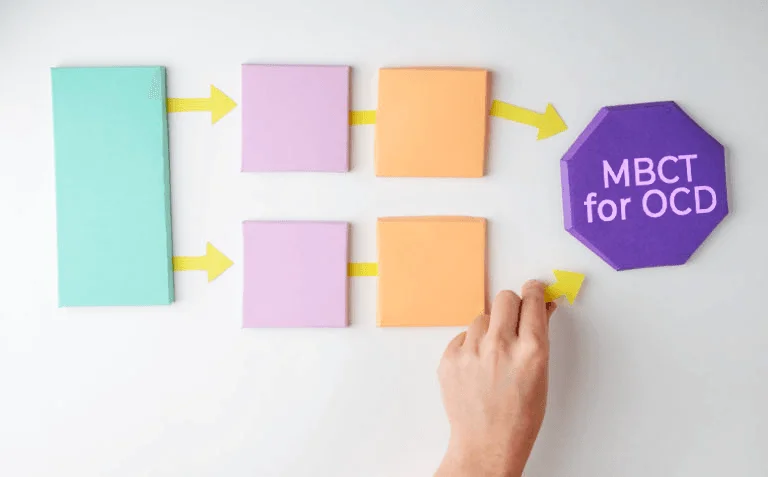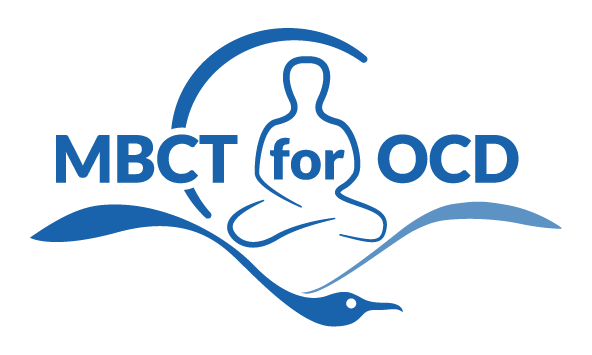MBCT for OCD
Mindfulness-Based Cognitive Therapy for Obsessive Compulsive Disorder
by Dr. Fabrizio Didonna

Rationale, Structure and Basic Principles
Mindfulness Based Cognitive Therapy (MBCT) for Obsessive Compulsive Disorder is an innovative, standardized and manualized treatment program designed to create significant clinical and life improvement in people who suffer from Obsessive Compulsive Disorder.
Based on the research and clinical experience of Dr Fabrizio Didonna and documented in his handbook Mindfulness-Based Cognitive Therapy for Obsessive Compulsive Disorder (New York, Guilford Press) the program integrates tools of Cognitive-Behavioral Therapy with the practice and clinical application of mindfulness and compassion.
This therapeutic program is the culmination of twenty years of the founder’s work with hundreds of people affected by Obsessive Compulsive Disorder, and about fifteen years of practicing and teaching mindfulness meditation, especially Mindfulness-Based Cognitive Therapy. The Mindfulness-Based Cognitive Therapy for Obsessive Compulsive Disorder program is clearly derived from and inspired by Mindfulness-Based Cognitive Therapy for depression, especially with respect to the framework, scope and several exercises, and as such can be considered an offspring of the model.
Nevertheless, Mindfulness-Based Cognitive Therapy
for Obsessive Compulsive Disorder has a different rationale from Mindfulness-Based Cognitive Therapy for depression, and many original and unique practices, exercises, themes and materials have been created, modified or added to work with this specific clinical population.
The heart of Mindfulness-Based Cognitive Therapy
for Obsessive Compulsive Disorder lies in acquainting patients with the modes of mind and cognitive mechanisms that characterize Obsessive Compulsive Disorder, while simultaneously inviting them to develop a new relationship to their internal experience. Patients learn to view thoughts as events in the mind, independent of their content and emotional charge. They need not be disputed, fixed or changed but are held in a more spacious awareness, large enough to contain aspects of the self deemed both broken and whole.
Over time and through intensive practice during the sessions and at home, this intensive therapeutic program aims to help individuals with Obsessive Compulsive Disorder, step by step, to recognize and overcome the specific and/or generic biases and dysfunctional mechanisms that activate and maintain their disorder, to learn new effective strategies to neutralize those mechanisms and to develop stable and healthy ways to relate to their internal experience.
The main ‘work’ of the program is done at home between classes, using audio files with guided exercises that support participants’ developing practice outside of class. Home practice will take about 1 hour a day, 7 days a week.In each session, participants have the opportunity to talk about their experiences with the home practices, the obstacles that inevitably arise, and how to deal with them skillfully. Each class is organized around a theme that is explored through both group inquiry and mindfulness practice.
Number of sessions and length of time
Mindfulness-Based Cognitive Therapy for Obsessive Compulsive Disorder is made up of 11 sessions, each lasting 2½ hours – except for Session 3, which is with family members and/or partners and lasts 1½ hours, and Session 11, which is a one-day session of intensive practice and review.
Key features of the Mindfulness-Based Cognitive Therapy for Obsessive Compulsive Disorder Program

Mindfulness-Based Cognitive Therapy
for Obsessive Compulsive Disorder Thumbnail Session Rationale and Outline

Comments And Reports From Participants
Who is qualified to lead Mindfulness-Based Cognitive Therapy for Obsessive Compulsive Disorder?
Working with Obsessive Compulsive Disorder using a mindfulness-based approach can be a challenging task and requires clinical experience with this kind of disorder, training and experience in leading mindfulness groups and regular personal meditation practice. For this reason, mental health professionals who want to be trained in and provide Mindfulness-Based Cognitive Therapy for Obsessive Compulsive Disorder would preferably have the following characteristics:
- 1. Have been trained and certified in mental health, such as clinical psychologists, therapists and psychiatrists, and have experience in treating individuals with Obsessive Compulsive Disorder or been trained in using an effective treatment model, preferably CBT, to help people with this kind of disorder.
- 2. Be experienced mindfulness instructors who are familiar with Obsessive Compulsive Disorder and are trained in working with this kind of disorder, and who have a good understanding of and experience in therapeutic interventions for psychiatric disorders.
In order to learn how to use Mindfulness-Based Cognitive Therapy
for Obsessive Compulsive Disorder and effectively implement the program in a group or individual setting, it is important that future instructors:
- 1. attend a formal training program for Mindfulness-Based Cognitive Therapy for Obsessive Compulsive Disorder with certified teachers;
- 2. regularly practice mindfulness;
- 3. attend a 11-session Mindfulness-Based Cognitive Therapy for Obsessive Compulsive Disorder group (or in alternative an MBCT or MBSR group) as a participant;
- 4. seek out and get supervision by a certified Mindfulness-Based Cognitive Therapy for Obsessive Compulsive Disorder supervisor whenever possible in person or through live or recorded video when this is not possible.
Adapted from Didonna, F (2018). Mindfulness-Based Cognitive Therapy for Obsessive Compulsive Disorder. New York: Guilford
Workshop at Harvard University by Prof. Fabrizio Didonna on MBCT for OCD
Listen to Fabrizio Didonna's Podcast Interview for Noble Mind - Boston (U.S.)
Workshop at Harvard University by Prof. Fabrizio Didonna on MBCT for OCD
Interview to Fabrizio Didonna on Mindfulness-Based Cognitive Therapy for Obsessive Compulsive Disorder
Rationale, Structure and Basic Principles
Mindfulness Based Cognitive Therapy (MBCT) for Obsessive Compulsive Disorder is an innovative, standardized and manualized treatment program designed to create significant clinical and life improvement in people who suffer from Obsessive Compulsive Disorder.
Based on the research and clinical experience of Dr Fabrizio Didonna and documented in his handbook Mindfulness-Based Cognitive Therapy for Obsessive Compulsive Disorder (New York, Guilford Press) the program integrates tools of Cognitive-Behavioral Therapy with the practice and clinical application of mindfulness and compassion.
This therapeutic program is the culmination of twenty years of the founder’s work with hundreds of people affected by Obsessive Compulsive Disorder, and about fifteen years of practicing and teaching mindfulness meditation, especially Mindfulness-Based Cognitive Therapy. The Mindfulness-Based Cognitive Therapy for Obsessive Compulsive Disorder program is clearly derived from and inspired by Mindfulness-Based Cognitive Therapy for depression, especially with respect to the framework, scope and several exercises, and as such can be considered an offspring of the model.
Nevertheless, Mindfulness-Based Cognitive Therapy
for Obsessive Compulsive Disorder has a different rationale from Mindfulness-Based Cognitive Therapy for depression, and many original and unique practices, exercises, themes and materials have been created, modified or added to work with this specific clinical population.
The heart of Mindfulness-Based Cognitive Therapy
for Obsessive Compulsive Disorder lies in acquainting patients with the modes of mind and cognitive mechanisms that characterize Obsessive Compulsive Disorder, while simultaneously inviting them to develop a new relationship to their internal experience. Patients learn to view thoughts as events in the mind, independent of their content and emotional charge. They need not be disputed, fixed or changed but are held in a more spacious awareness, large enough to contain aspects of the self deemed both broken and whole.
Over time and through intensive practice during the sessions and at home, this intensive therapeutic program aims to help individuals with Obsessive Compulsive Disorder, step by step, to recognize and overcome the specific and/or generic biases and dysfunctional mechanisms that activate and maintain their disorder, to learn new effective strategies to neutralize those mechanisms and to develop stable and healthy ways to relate to their internal experience.
The main ‘work’ of the program is done at home between classes, using audio files with guided exercises that support participants’ developing practice outside of class. Home practice will take about 1 hour a day, 7 days a week.In each session, participants have the opportunity to talk about their experiences with the home practices, the obstacles that inevitably arise, and how to deal with them skillfully. Each class is organized around a theme that is explored through both group inquiry and mindfulness practice.
Number of sessions and length of time
Mindfulness-Based Cognitive Therapy for Obsessive Compulsive Disorder is made up of 11 sessions, each lasting 2½ hours – except for Session 3, which is with family members and/or partners and lasts 1½ hours, and Session 11, which is a one-day session of intensive practice and review.
Key features of the Mindfulness-Based Cognitive Therapy for Obsessive Compulsive Disorder Program

Mindfulness-Based Cognitive Therapy
for Obsessive Compulsive Disorder Thumbnail Session Rationale and Outline

Comments And Reports From Participants
Who is qualified to lead Mindfulness-Based Cognitive Therapy for Obsessive Compulsive Disorder?
Working with Obsessive Compulsive Disorder using a mindfulness-based approach can be a challenging task and requires clinical experience with this kind of disorder, training and experience in leading mindfulness groups and regular personal meditation practice. For this reason, mental health professionals who want to be trained in and provide Mindfulness-Based Cognitive Therapy for Obsessive Compulsive Disorder would preferably have the following characteristics:
- 1. Have been trained and certified in mental health, such as clinical psychologists, therapists and psychiatrists, and have experience in treating individuals with Obsessive Compulsive Disorder or been trained in using an effective treatment model, preferably CBT, to help people with this kind of disorder.
- 2. Be experienced mindfulness instructors who are familiar with Obsessive Compulsive Disorder and are trained in working with this kind of disorder, and who have a good understanding of and experience in therapeutic interventions for psychiatric disorders.
In order to learn how to use Mindfulness-Based Cognitive Therapy for Obsessive Compulsive Disorder and effectively implement the program in a group or individual setting, it is important that future instructors:
- 1. attend a formal training program for Mindfulness-Based Cognitive Therapy for Obsessive Compulsive Disorder with certified teachers;
- 2. regularly practice mindfulness;
- 3. attend a 11-session Mindfulness-Based Cognitive Therapy for Obsessive Compulsive Disorder group (or in alternative an MBCT or MBSR group) as a participant;
- 4. seek out and get supervision by a certified Mindfulness-Based Cognitive Therapy for Obsessive Compulsive Disorder supervisor whenever possible in person or through live or recorded video when this is not possible.
Adapted from Didonna, F (2018). Mindfulness-Based Cognitive Therapy for Obsessive Compulsive Disorder. New York: Guilford





